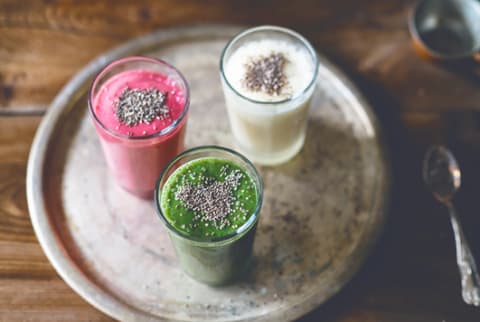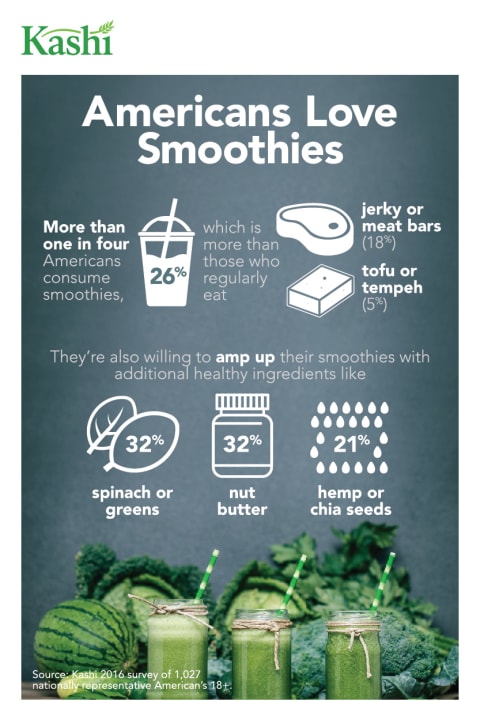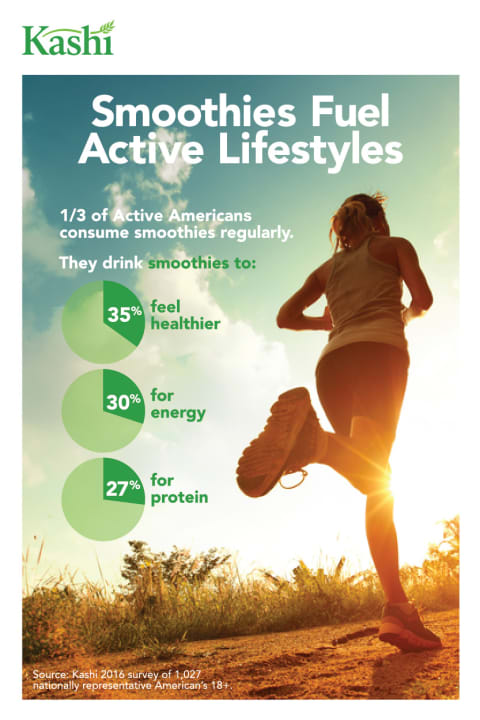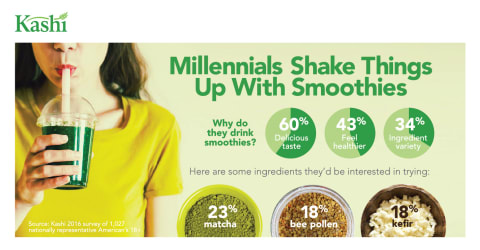Advertisement

Kicking your day off with a nutritious smoothie can have a variety of amazing benefits, from more energy to staying full till lunchtime. Smoothies are often the go-to for packing maximum nutrients into one meal.
But have you ever wondered why smoothies have gained popularity over the past few years? Or even what other people are adding to their smoothies that could make yours better?
Here are some things we can learn from the smoothie-loving community across the U.S. that might just benefit your breakfast blends:
Americans are all about smoothies

According to a recent survey from Kashi, more than one in four Americans typically consume smoothies on a regular basis. While half of these smoothie drinkers do it for the delicious taste, 32 percent are drinking them to feel healthier and to incorporate more fruit in their diets. Additionally, 23 percent are in it for the protein, and 20 percent drink them for easy vegetable inclusion.
It’s no surprise that many smoothie drinkers say these blended beverages make them feel healthier; there’s an undeniable feel-good vibe you get after drinking a high-quality smoothie!
Smoothies are a go-to for people with active lifestyles

A third of active people in America drink smoothies as part of their healthy routines. In fact, 30 percent of those cite energy and protein as their motivation for getting out the blender.
When done right, smoothies offer nourishing ways to recover from workouts and give you sustained energy levels for hours after consumption—that’s where protein really helps. Protein aids in muscle recovery and helps you feel satiated for longer.
There are a variety of powdered protein sources on the market like whey, casein, and soy, but plant-based protein powders—like those from Kashi's new line of GOLEAN plant-powered shakes—are easier to digest than animal-based sources, free of common allergens, and chock-full of probiotics and nutrient-dense superfoods.
This is likely why 40 percent of active Americans say they would most likely drink a protein-filled smoothie around their workout—with nearly 30 percent drinking one post-workout, and 19 percent opting for a pre-workout smoothie.
Millennials are adding new ingredients to their smoothies
Simply put, millennials love smoothies: A whopping 60 percent drink them based on delicious taste, while 43 percent drink them to feel healthier and to sneak different ingredients into one meal or snack.

Active Americans drink smoothies because they can easily add a variety of beneficial ingredients, and millennials in particular are more likely to try unique add-ins like superfoods and adaptogens since they tend to be more adventurous with their food choices.
All in all, the key to a great smoothie really lies in a good balance of healthy and delicious ingredients to create something nutritious that you'll love drinking.
If you’re looking to take your smoothies to the next level, start with a base of a few friendly ingredients like frozen bananas, almond milk, and berries, and try adding some new extras to bump up nutrients like vitamins, minerals, protein, and fiber.
Some great add-ins to try:
- Greens (spinach or kale are great for this)
- Nut butter
- Chia seeds
- Kefir
- Beet powder
- Matcha
- Bee pollen
- Algae (like spirulina)
Need some inspiration? Try the below recipe to blend your way to a better smoothie:
Kashi GOLEAN Matcha Tea Mantra Blend
Serves 2
Ingredients
- 1½ cups unsweetened almond milk
- 1 cup baby spinach
- 1 frozen banana
- 1 teaspoon bee pollen
- 2 teaspoon matcha powder
- 1 serving Kashi GOLEAN Plant-Powered Shake, Matcha Tea Mantra
Preparation
Place all ingredients into your blender and blend until smooth. Serve immediately.
